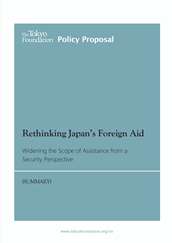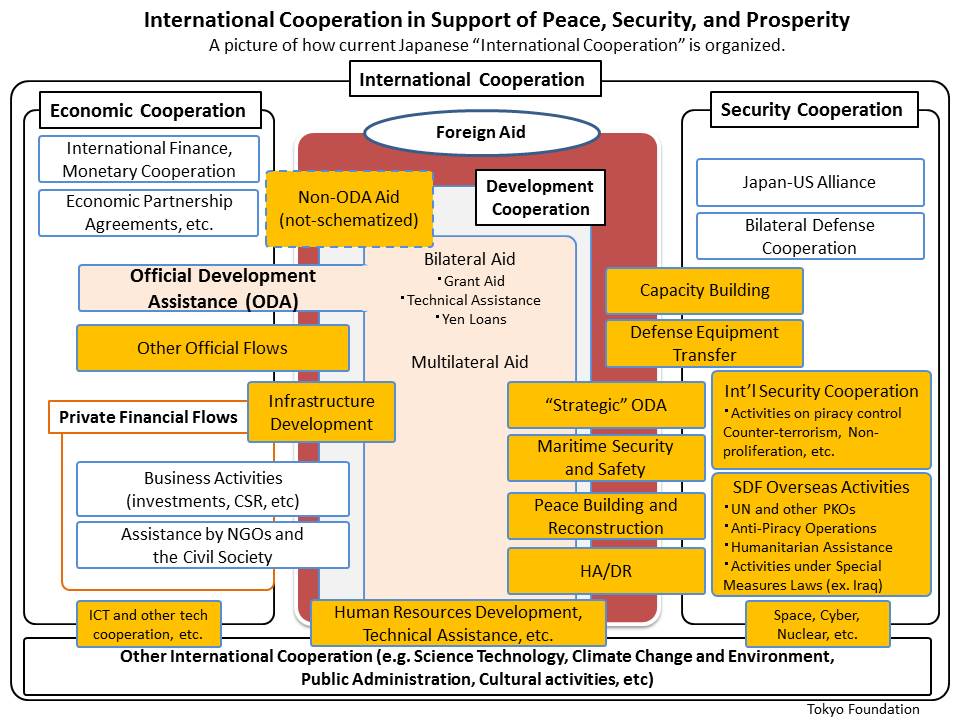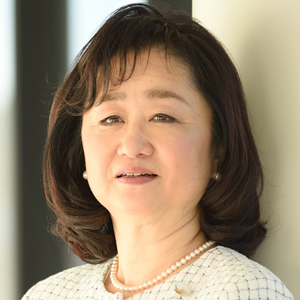- Policy Proposal
- Other
Rethinking Japan’s Foreign Aid: Widening the Scope of Assistance from a Security Perspective
September 10, 2015
FOREWORD*
(To the English summary of the Policy Proposal)

Foreign aid has been called Japan’s “most important foreign policy tool.” It forms the basis for our influence among the world’s developing countries and is said to play a pivotal role in our diplomatic activities. But changing circumstances, including our own fiscal constraints, have made it imperative for Japan to make more effective use of economic assistance and other resources by creatively combining them in pursuit of common foreign-policy objectives.
In the following summary of our policy proposals, we make the case for an overarching foreign aid policy that requires expanding the areas of peace-building assistance beyond the confines of traditional development cooperation to incorporate a broader range of tools. To achieve this, we outline nine specific policy recommendations.
August 2015
Masahiro Akiyama
President, Tokyo Foundation
OVERVIEW
Japan has an important role to play in support of international peace, stability, and prosperity. For decades now, Japan’s contribution to international society has focused overwhelmingly on support for economic and social development via official development assistance (ODA). Henceforth Japan needs to further broaden the scope of its overseas activities, especially in relation to international security. We are facing ever-diversifying security threats, partly due to globalization—including piracy, violent extremism, large-scale natural disasters, and epidemics, in addition to the armed conflicts of the past—that possibly may negate the development gains of recent years. Moreover, international peace and stability is essential to the well-being of our country.
In its National Security Strategy (NSS) and Japan Revitalization Strategy, the government of Prime Minister Shinzo Abe has identified the creation of an international environment favorable to Japan a national goal. Recognizing the importance of foreign aid as a policy tool for achieving this goal, the government also formulated a new Development Cooperation Charter, approved by the cabinet in February 2015. But achieving such a challenging objective in today’s rapidly changing world requires a more focused use of resources and a comprehensive framework that integrates the entire range of foreign aid tools at our disposal. Thus, to facilitate Japan’s engagement in the tasks required for international peace and stability, we have drawn up the following policy recommendations.
SUMMARY OF PROPOSALS
Building the Foundation for a Comprehensive Approach
Proposal 1: To better address the issues of international peace and security, Japan’s peace-building initiatives should be expanded to encompass activities under every relevant policy area, from economic and social development to diplomacy and security. The government should begin erecting a framework for a truly “comprehensive approach” to unify policy goals and guidelines across government agencies and facilitate operational cooperation in the field.
Until now, Japan has placed peace-building activities under the rubric of economic and social development assistance and has limited such activities, narrowly targeting conflict prevention and post-conflict reconstruction. But security has multiple dimensions and requires wide-ranging support in every sector. This echoes the notion referred to in the National Security Strategy calling for a framework to facilitate “seamless assistance in security-related areas,” combining various modes of assistance. It is time to act on that policy, and to do so, the government needs to go beyond the calls for greater interagency cooperation and to promote the “All Japan approach” currently being advanced in the field. The Japanese government should also consider extending the scope of its peace-building assistance for fragile and unstable states.
Proposal 2: We recognize the fact that development and regional stability issues are becoming ever more closely intertwined. In order for the government to better respond to the challenges ahead, an office of peace building and international security should be created within the National Security Council—the central organ for orchestrating a comprehensive approach —to coordinate economic aid and SDF operations abroad.
We call on the government to create an administrative unit within the National Security Council to oversee cooperation in the areas of peace building and international security, including overseas activities of the Self Defense Forces (SDF) like peacekeeping, counter-piracy and other multinational operations, HA/DR (humanitarian assistance and disaster relief), and capacity building. Where applicable, the use of ODA and other forms of assistance should be examined closely at this level to attain multiplier effects. The unit should be given the capability and authority to coordinate interagency policy in relation to national and regional strategies that are drawn up on the basis of long-term analyses of the internal and external situation; to specify the resources needed to put those strategies into effect; and to establish priorities for the allocation of resources and guidelines for their use.
Enhancing the Impact of Japan’s Peace-Building Assistance
Proposal 3: The development and pooling of civilians equipped to provide security-related assistance is an urgent priority for Japan. As part of this effort, the current Foreign Ministry program for human resources development in the area of peace building, which is earmarked for expansion, should train civilians to work effectively with law-enforcement and security personnel in the field. At the same time, steps should be taken to create an environment conducive to routine communication between the aid community and the security sector, both at the policymaking level and in the field.
Anticipating that peace-building personnel may be called on to work collaboratively with law-enforcement and military officials, Japan needs to develop a pool of trained civilians equipped with a cross-sectoral grasp of security and development issues. They should also have a good understanding of the legal bases and constraints, and operational formats governing the SDF. Furthermore, the government should step up its efforts to build active collaborative mechanisms between the Ministry of Foreign Affairs and the Japan International Cooperation Agency (JICA) as well as between the Ministry of Defense and the SDF so as to cultivate a shared culture of respect and working together. Facilitating joint planning and field operations will also benefit both communities to enhance field situational awareness and risk management, and in streamlining evacuation procedures.
Proposal 4: For each overseas SDF mission, a foreign policy and development advisor should be appointed to provide diplomatic support. Having such political advisors at the field level would serve to strengthen information-sharing and collaboration between the SDF and diplomatic personnel. They could also help clarify the foreign-policy relevance and rationale of the SDF’s activities and provide diplomatic advices in external relations for the SDF mission commander.
In July 2014, the government established the new post of vice-minister of defense for international affairs to strengthen defense diplomacy functions within the Ministry of Defense. This is an important step in properly communicating Japanese defense policies abroad and promoting top-level security cooperation. However, we believe that to support the SDF’s international engagements, there is also a need for lower-level political counselors or senior political advisors for each deployment to provide direct diplomatic and foreign-policy support to SDF mission commanders. Such support is needed as the mission commander is the sole or one of very few representatives for Japan (when there is no diplomatic presence) in field operations.
Proposal 5: Japan’s defense installation in Djibouti should be assigned a broader role to support regional security. It can uphold such functions and serve as a supply base for SDF operations in providing emergency humanitarian aid, disaster relief, peacekeeping, and reconstruction assistance in Africa. Furthermore, the government should move swiftly to institute and fund an operable system of civil-affairs programs by the SDF.
As a part of international counter-piracy efforts off the Horn of Africa, Japan maintains a base in Djibouti for the purpose of conducting aerial surveillance and early warning operations. Going forward, this installation should be assigned broader functions as a supply base for SDF operations in the provision of emergency humanitarian aid, disaster relief, peacekeeping, and reconstruction assistance in Africa. Also, as a point of entry to the region, the facility can serve as a center of SDF pre-deployment training and capacity-building programs, a coordination hub with aid personnel, and for the rescue and evacuation of Japanese civilians (that is, noncombatant evacuation operations), and a point for information sharing and security cooperation with the United States, France, the EU and other partners. In order to maintain and advance SDF operations, it is imperative that the SDF start providing civil-affairs programs for the local community. The Japanese government should establish a flexible system and funding scheme so that deployed forces can initiate such programs with the approval of the Japanese ambassador and the SDF commanding officer in the field. It could well be linked to regional ODA projects and could help Japan build and maintain ties in the host region, thereby strengthening Japan’s international presence.
Developing Non-ODA Peace-Building Tools
Proposal 6: We strongly urge the government to begin instituting new, more flexible mechanisms of economic cooperation and linking such aid with its security cooperation policies. It should also expand its interpretation of the principles governing Japanese ODA to permit aid for infrastructure with the potential for dual civilian-military use.
We believe that Japan should remain faithful to its longstanding postwar commitment to peace and to the principle that “any use of ODA for military purposes or for aggravation of internal conflicts should be avoided.” At the same time, we must recognize the fact that public resources in developing countries may be heavily concentrated in the law-enforcement and military branches, and that any effective aid program needs to take into account the role such agencies play in the delivery of disaster relief, humanitarian assistance, and other activities to assist and protect civilians. For this reason, Japan should consider developing mechanisms for non-ODA economic cooperation applicable to situations and purposes outside the scope of current practices. In addition, the government should relax its interpretation of the abovementioned principle to allow the use of ODA for the development of infrastructure with the potential for dual civilian-military use, such as airport runways.
Proposal 7: To support efforts for regional stability, the efficacy of the capacity-building assistance programs carried out by the Defense Ministry and the SDF needs to be enhanced. Changes in the legal infrastructure, including amendments to the Act for the Establishment of the Ministry of Defense, will be necessary to enhance the design and implementation of these projects and allow for the transfer of needed equipment.
Japan’s capacity-building assistance differs from that of the United States and European countries in that it is not geared to building recipients’ capacity to conduct combat operations. Instead, it is oriented to such goals as enabling “recipient countries to contribute to the stability and improvement of the international security environment” targeting such areas as HA/DR, maritime security, military medicine, and UN peacekeeping operations. To enhance the effectiveness of such assistance, Japan needs to revise its legal infrastructure to incorporate capacity building among the official duties of the Ministry of Defense and the SDF. It should also design a system for a careful, ongoing review of capacity-building projects to ensure that they do not have such unintended consequences as fueling regional tensions or supporting government oppression against its own people.
Proposal 8: The new “Three Principles on Transfer of Defense Equipment and Technology” has opened the way for the transfer of defense equipment needed to preserve the stability of the region. Japan should begin laying the foundation for measures (such as grants, loans, and operational support) to assist other countries in the acquisition of costly defense equipment.
“The Three Principles on Transfer of Defense Equipment and Technology,” approved by the cabinet in April 2014, have opened the way for the transfer of defense equipment for purposes of international security cooperation, including UN peacekeeping, anti-terrorism, and anti-piracy operations, as well as to help enhance the security capabilities of developing countries. This has greatly expanded the scope of Japan’s potential contribution to international security by permitting the transfer of equipment deemed consistent with peaceful purposes. It has also made possible the export of equipment to be used for cooperation in search and rescue, transport, early warning, surveillance, and minesweeping with close, like-minded countries. One stumbling block is cost. Keeping in mind the region’s growing challenges, including the defense of sea lanes, the government should examine the possibilities for providing public and private forms of financial assistance to purchasing countries.
Looking Ahead: Formulating the Principles for Comprehensive Cooperation
Proposal 9: Japan’s foreign aid should provide meaningful support geared to the two basic goals of human security, namely, “freedom from want” and “freedom from fear.” With these broad aims in mind, the government should draw up a set of overarching principles and policies to guide a truly comprehensive approach to international cooperation, extending to such areas as public administration and culture, to chart a long-term course for a “proactive contribution to peace based on international cooperation.”
The preamble of the Constitution of Japan states that “all peoples of the world have the right to live in peace, free from fear and want” and pledges the nation’s ongoing efforts “to accomplish these high ideals.” These freedoms are the two pillars of human security, which is the guiding principle of the Development Cooperation Charter. Yet, in practice, Japanese foreign aid has been slanted toward “freedom from want.” To act on the nation’s constitutional ideals, the government should open the way for an approach to international cooperation that includes greater aspects of freedom from fear.
Looking ahead, Japan will need a set of principles to guide an approach to international cooperation that integrates all relevant sectors, each of which has an impact on the others. We should begin now to systematically integrate all the existing tools of foreign aid into a comprehensive and seamless policy framework, enhancing genuine partnership among a wide range of public, private, and nonprofit actors in Japan’s international cooperation.

* * *
About the Project on “Linking Foreign Aid and Security Cooperation”
This project aims to assess Japan’s foreign assistance from the perspective of security. Particularly, it explores approaches to achieving more effective linkages between traditional aid and such Ministry of Defense initiatives as international peace cooperation activities and capacity building of other militaries. The project also studies similar trends in other donor countries in the hope of clarifying Japan’s foreign policy priorities and the importance of international peace and stability for its own security.
Needless to say, maintaining international peace and stability is one of Japan’s chief interests. However, mounting public debt at home and growing contentiousness with its East Asian neighbors may inhibit Japan from taking a further proactive role. Thus, Japan’s foreign engagement needs to be reexamined so as to produce the maximum results within limited means and resources. This requires a more synthesized, inter-agency approach that goes beyond traditional tool-based or country-based planning. Such planning must start with the identification of strategic objectives in a given region and then assess policy issues and the available means to address the problems.
The United States and many European countries are adopting similar approaches with the understanding that international peace and stability are essential for maintaining the international order and safeguarding economic interests that pertain to national security. The EU, for example, has been adopting rigorous policy measures under a “comprehensive approach” to address linkages between development and security. This project also examines the lessons learned by these countries in Iraq and Afghanistan and in the wake of the various insurgencies of the 1990s and explores the possibility of multilayered security cooperation with such like-minded countries.
Project Leader:
Akiko Fukushima, Senior Fellow, Tokyo Foundation
Member:
Ippeita Nishida, Research Fellow & Project Manager, Tokyo Foundation
* The original (full) version of the report in Japanese was published in October 2014. It is available at: http://www.tkfd.or.jp/files/doc/2014-03.pdf

